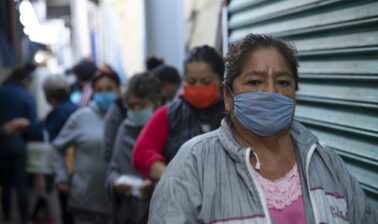Infographics
Racismo Sistémico, Brechas y COVID-19: Impactos en la Salud de los Latinos
Published on: September 17, 2020. Updated on: October 20, 2020.
About the Data Insights
La pandemia de COVID-19 ha puesto de relieve los efectos del racismo sistémico y otros factores de riesgo sobre la salud de los latinos en los Estados Unidos. El racismo sistémico junto con los desafíos de la inmigración, las barreras del idioma y otros factores ponen a los latinos en mayor riesgo de contraer COVID-19. La comunidad latina e hispana no es monolítica y abarca un grupo diverso de personas. Los latinos representan el 18,5% de la población de EE.UU, pero representan el 29.5% de los casos de COVID-19 y la tasa de latinos hospitalizados por el virus es 4,6 veces más que la de los blancos
Esta infografía identifica los factores de riesgo, incluido el empleo desproporcionado como trabajadores esenciales, tasas más bajas de cobertura de seguro médico y barreras lingüísticas y culturales, y brinda soluciones prácticas para mejorar la salud de los latinos.
COVID-19 Impact:
US Latino population in 2018: US Census Bureau, Quick Facts
COVID-19 share of cases: The Centers for Disease Control and Prevention, COVID Data Tracker, as of 9/2/20
- NOTE: Updated by CDC on September 20, 2020
COVID-19 hospitalization rate: The Centers for Disease Control and Prevention, COVID-19 Hospitalization and Death by Race/Ethnicity, as of 9/2/20
Share of pregnant women with COVID-19: The Centers for Disease Control and Prevention, Data on COVID-19 during Pregnancy
- NOTE: Covers January 22-September 8, 2020
Social & Economic Risk Factors:
Language Barriers: Language Barriers Hinder Spanish-Speaking Immigrants From Getting Coronavirus Tests
Multi-Generational Homes: Pew Research Center, A record 64 million Americans live in multigenerational households
Immigration Concerns: STAT, Fearing deportation, many immigrants at higher risk of COVID-19 are afraid to seek testing or care
Essential Worker Status: New American Economy, Hispanic Americans in Healthcare and in Essential Roles
Less likely to have paid leave: Center for American Progress, Latinos Least Likely to Have Paid Leave or Workplace Flexibility
Less likely to have access to health insurance: KFF, Changes in Health Coverage by Race and Ethnicity since the ACA, 2010-2018
Representation in physician workforce, medical school educators, and medical students: Association of American Medical Colleges, Diversity in Medicine: Facts and Figures 2019
Representation in psychologist workforce: American Psychological Association, CWS Data Tool: Demographics of the U.S. Psychology Workforce
Share of psychologists that can speak Spanish: American Psychological Association, 2015 APA Survey of Psychology Health Service Providers
Impact on Inequality:
Economic Downturn:Pew Research Center, Coronavirus Economic Downturn Has Hit Latinos Especially Hard
COVID-19 unemployment benefits: Marketplace, “It’s not just undocumented immigrants who could be left out of the stimulus money”
Increasing food insecurity: Salud America!, Coronavirus Is Worsening Food Insecurity for Latino, Other Families
Increasing housing insecurity: Urban Institute, New Data Suggest COVID-19 is Widening Housing Disparities by Race and Income
Steps to Take Within the Health Care Space:
- Improve access to culturally competent care: “Culturally Competent Care for Latino Patients”, Markkula Center for Applied Ethics, Santa Clara University
- Increase workforce representation: Fact Sheet: The Need for Diversity in the Health Care Workforce, AAPCHO
- Anti-racism training in health systems & medical schools: “Racism, Hazing And Other Abuse Taints Medical Training, Students Say,” NPR
- Improve bidirectional literacy: The Importance of Effective Communication in Healthcare Practice, Harvard Public Health Review
- Support community health centers & workers and build trust: CDC, Promotores de Salud/Community Health Workers
Steps to address economic and social challenges: Salud America!, 19 Ways to Ensure Health Equity for Latinos During (and After) COVID-19
More Related Content
See More on: Health Equity | Coronavirus

